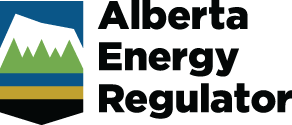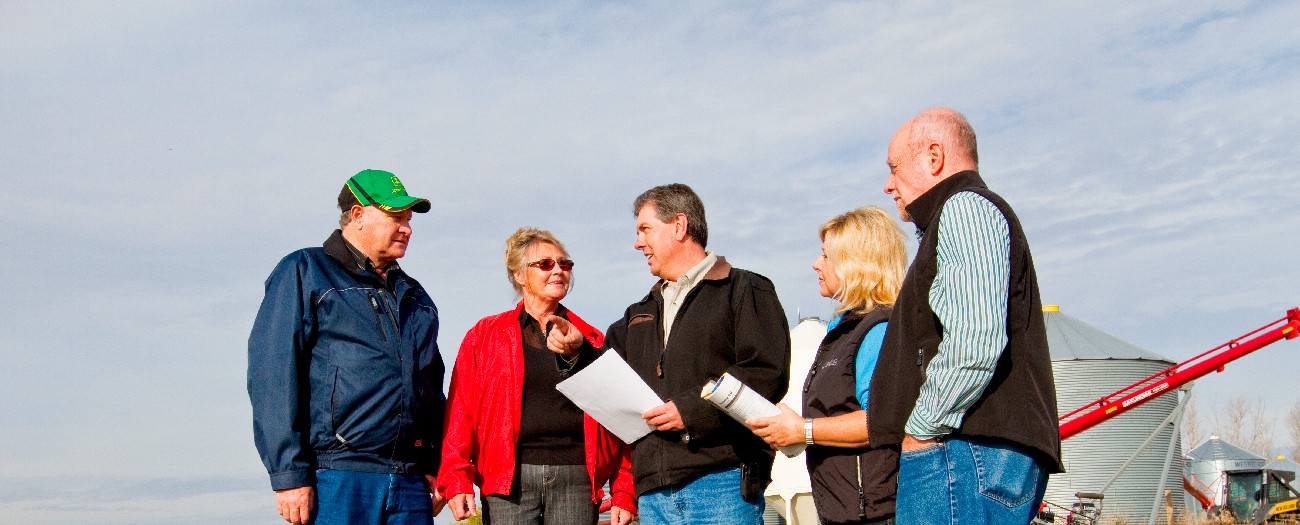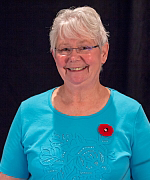Synergy groups bring communities and companies to the table
Alberta - November 21, 2016On Christmas Day, 1974, Judy Winter and her husband took ownership of a family farm in a community that looks very different today.
From her kitchen window, Winter can see the Rockies, cows in the field, and sunshine on the grain bins. For nearly 50 years, she’s watched the farmland around Caroline, Alberta, grow to include oil rigs and wells, lumber yards, and gravel pits. Resource development brought in money and jobs, but it was not an easy transition. Conflict between oil and gas companies and area residents often made both parties wary of meeting, and it sometimes turned bitter.
In the mid-1990s, concerned local groups—known as synergy groups— began finding solutions by talking, not arguing. Winter is one of the founding “mothers” of Alberta’s synergy movement, having helped bring industry, government, and community members together to tackle tough issues for decades.
You bring the donuts and the experts, and I’ll provide the coffee and the hall and the people.
Judy Winter
It began with a phone call
In the face of growing animosity, rural communities across the province needed to find solutions to their own unique energy development issues. In Winter’s case, she and others were worried about a company’s plan to drill a water source well just south of nearby Butte.
“Maybe we should try talking to the company instead of just sitting here complaining,” she’d said to a few friends. They picked up the phone.
This was the first time Winter invited a company to sit down with her and her neighbours. The company was surprised. “They were like, ‘whoa….sit with you? Is it safe?’ and I said, ‘we will do our very best to keep it as a conversation, not as a confrontation,’” she recalls.
She told them: “You bring the donuts and the experts, and I’ll provide the coffee and the hall and the people.”
It took time to get other community members on board (and some still aren’t), but Winter found that most people wanted to be a part of the solution. In 1999, she and her peers formed the Butte Action Committee (BAC)—a synergy group whose main concern is freshwater management.
“We talked to each other like people, and then we got to the issue. It was amazing how that interlude of humanness sort of gentled the conversation.”
The synergy movement
It wasn’t until a few years later that Winter realized just how many other communities were working on similar initiatives. The Alberta Energy Regulator (AER)—then the Alberta Energy and Utilities Board—set up a gathering of these grassroots multistakeholder groups in 2002. “That’s when we realized we weren’t a lone voice in the wilderness,” Judy says.
Synergy groups, so called for their focus on working together, include representatives from the community, the government, and the oil and gas industry. There are now over 30 synergy groups across Alberta.
Every synergy group is unique. They reflect the specific type of energy development in an area and the concerns of a particular community. Groups hold different events (such as information nights) and have a varying number of members, but they all focus on bringing those involved and impacted by energy development to the same table.
Oil and gas companies do not have to participate in synergy groups. According to Winter, getting them to the table can be a challenge, but more and more industry is becoming involved. The work sets an informal standard for community engagement, Winter explains, that can influence a company’s policies or, over time, government regulations.
With funding from the AER and the Canadian Association of Petroleum Producers, community members, government representatives, and industry agents joined forces in 2006 to form Synergy Alberta: a not-for-profit organization that supports the province’s diverse synergy groups. It offers services such as event facilitation and networking opportunities.
Winter was instrumental in setting up Synergy Alberta’s mission and vision. She has been a director on the board for nearly 10 years, but will step down in 2017.
“The opportunities that have come down my path from my relationships with these synergy folks have just been mind boggling … I can’t imagine what my life would have been like without it.”
An eye to the future
Beyond establishing the BAC and sitting on Synergy Alberta’s board of directors, Winter is a member of the West Central Stakeholders (WCS) synergy group. With help from her daughter, a teacher in the area, she has helped make participation in WCS part of the local school curriculum. This gives kids the opportunity to learn about the oil and gas industry and put their problem-solving skills into practice outside the classroom.
While the future of synergy work ultimately lies with her 11 grandchildren and her community’s youth, Winter knows what she would like to see in ten years’ time.
“I hope synergy work is province-wide. And I would like it to branch out to be more than just energy,” she explains. Winter sees synergy work playing an important role in the renewable energy industry and the aggregate industry (gravel, stone, concrete) down the line.
For industry, Winter stresses that many communities just want oil and gas companies to come to the table, hear local perspectives, and share more about their work. As for concerned citizens, Judy says joining a synergy group “is your opportunity to be involved in your community, involved in the bigger picture, and actually have fun with people.”
Synergy Alberta recently hosted its tenth annual conference in Calgary. Participants included the Land Stewardship Centre, the Petroleum Services Association of Canada, the Clearwater Trails Initiative, the Surface Rights Board, the AER, and the Farmer’s Advocate Office.
Alex Handley, Writer



